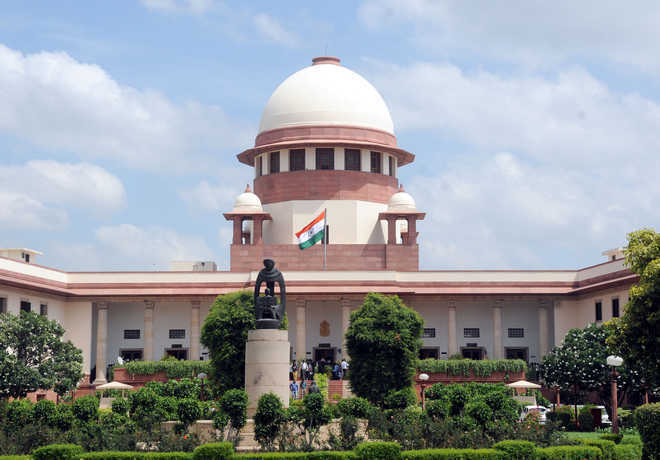
The Supreme Court on Friday refused to pass any orders on petitions seeking protection for women who wish to enter the Sabarimala temple.
Satya Prakash
Tribune News Service
New Delhi, December 13
The Supreme Court on Friday refused to pass any orders on petitions seeking protection for women who wish to enter the Sabarimala temple in Kerala.
“The situation at the moment is explosive. We don’t want any violence,” a Bench headed by Chief Justice of India Justice SA Bobde told senior advocate Colin Gonsalves, representing Rehna Fathima, after he complained that the Kerala Government was not allowing women to enter the temple.
“This is an age old practice going on for thousands of years. Balance of convenience requires that no order should be passed in your favour now. The matter is under reference and if it is ultimately decided in your favour, we will protect you,” the Bench said, adding that the matter has already been referred to a seven-judge Bench.
“I will set up the seven-judge Bench at the earliest, the CJI said.
On behalf of another petitioner Bindu Ammini, senior advocate Indira Jaising said the petitioners opposed violence. She requested the court to protect them on their visit to Sabarimala as there was no stay on the September 2018 verdict allowing entry of women of all age groups into the Sabarimala Temple.
“We know that the law is in your favour. It’s an emotive issue. That’s why the court thought it fit to refer it to a larger Bench. Please have patience. We are not saying don’t allow her to go in, but we are not looking at passing any order right now,” the Bench said.
"We know that the law is in your favour. It’s an emotive issue."
It said, “If she can go and pray, we don’t have any problem. We get your point that a court would pass such an order. But we are using our discretion and will not be passing any order,” the Bench said.
Enlarging the scope of Sabarimala Temple entry restrictions issue, the Supreme Court on November 14 referred to a seven-judge Bench the issue of discriminatory practices in other religions as well for laying down constitutional principles for determination of such issues.
By a majority verdict of 3:2, a five-judge Bench headed by the then CJI Ranjan Gogoi framed seven issues for consideration of the seven-judge Bench for enunciating constitutional principles to be followed in dealing with such issues in any religion. The other two judges who were part of the majority verdict were Justice AM Khanwilkar and Justice Indu Malhotra.
The verdict had come on petitions seeking review of its September 28, 2018 judgment allowing entry women, irrespective of their age, into the Lord Ayyappa’s hilltop temple at Sabarimala in Kerala.
While the majority referred the matter to a larger Bench, Justice Rohinton Nariman and Justice DY Chandrachud had dismissed the review petitions, saying: “Organised acts of resistance to thwart the implementation of this judgment must be put down firmly.”
The majority verdict took note of the fact that the debate about constitutional validity of practices entailing into restriction of entry of women generally in places of worship was not limited to Sabarimala Temple alone but also arose in respect of entry of Muslim women in a Durgah/Mosque and entry of Parsi women married to a non-Parsi into the holy fire place of an Agyari.
If a particular practice was essential to religion or was an integral of the religion, was also pending before it in respect of female genital mutilation in Dawoodi Bohra community, the Bench noted.
“It is time that this Court should evolve a judicial policy befitting to its plenary powers to do substantial and complete justice and for an authoritative enunciation of the constitutional principles by a larger bench of not less than seven judges.
By 4:1 verdict, a five-judge Constitution Bench headed by the then CJI Dipak Misra had had on September 28, 2018 allowed entry women, irrespective of their age, into the Sabarimala Temple by declaring the age-old practice unconstitutional. Justice Malhotra, the lone woman on the Bench, had dissented. The majority had declared unconstitutional Rule 3(b) of the Kerala Hindu Places of Public Worship (Authorisation of Entry) Rules, 1965, which barred entry of women between 10 and 50 years of age into the temple.
The 2018 verdict had led to massive protests by Lord Ayyappa’s devotees—particularly after the entry of two women into the temple. The devotees believed the age-old tradition of not allowing women in the age group of 10 to 50 years to enter the shrine should be respected as the deity was an eternal celibate.
Join Whatsapp Channel of The Tribune for latest updates.



























